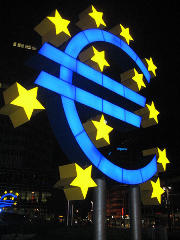
It was hard work, and an almost impossible task for the negotiators. What should have been an action based on the recognition that it is unthinkable to let a member of the Eurozone reach extravagant debt ratios compared to the Financial Stability Pact, instead became a three month feud and display of incompetence.
With a single currency and a single central bank, the Eurozone is one monetary zone. What is stunning is that for the first time the other members of the Eurozone seemed for the first time to realize how their lack of respect for their contract affected not only Greece but Portugal, Italy and Ireland and was in fact affecting the entire zone. Had they not read the Treaty of Maastricht?
The fact that one third of the financial support to Greece comes from the International Monetary Fund, as Jean Claude Trichet, the President of the European Central Bank expressed it, was a mistake. The IMF will be helpful as a participant to the implementation of the reform of Greece's public finance. Not as a lender.
There was absolutely no reason to draw those funds from the IMF since the crisis is within the Eurozone. Why would the US, Saudi Arabia, China, India, Brazil, the United Kingdom or Switzerland, who have nothing to do with Eurozone arrangements, fund a country that had no real problem of foreign indebtedness.
For Greece it is a dishonor -- Greece is borrowing today at 300 basis points above Germany. It is expensive, but, as proved recently through a € 5 billion bond issue, Greece has access to the international capital markets unlike other countries like Ukraine and Argentina who have been denied access to capital markets.
For the Eurozone, it is adding insult to injury. The public display of its inability to implement its Financial Stability Pact was bad enough. The fact that its member states did not assume their responsibilities as a monetary zone and needed the IMF, was increasing the public perception that they lack solidarity.
If the Euro wants to regain its credibility, much will need to be corrected. The Governance with five ineffective Presidents did not work. The heralded improvement of the Lisbon Treaty that took so much pain to be adopted is history -- the President of Europe is nothing more than a public notary.
The Financial Stability Pact has to be rewritten to provide automatic corrective mechanisms when a Member is in infraction of the rules. The criteria need to be revisited. A system of direct intervention in the form of a guarantee mechanism needs to be added to the ECB intervention.
The fact that an agreement was found is a tribute to the capability of Europeans to compromise. But their agreement compromises the status of the Euro as a reserve currency. The last three months have been a sad display of the cacophony within European Union. It will take time and leadership to be corrected effectively.